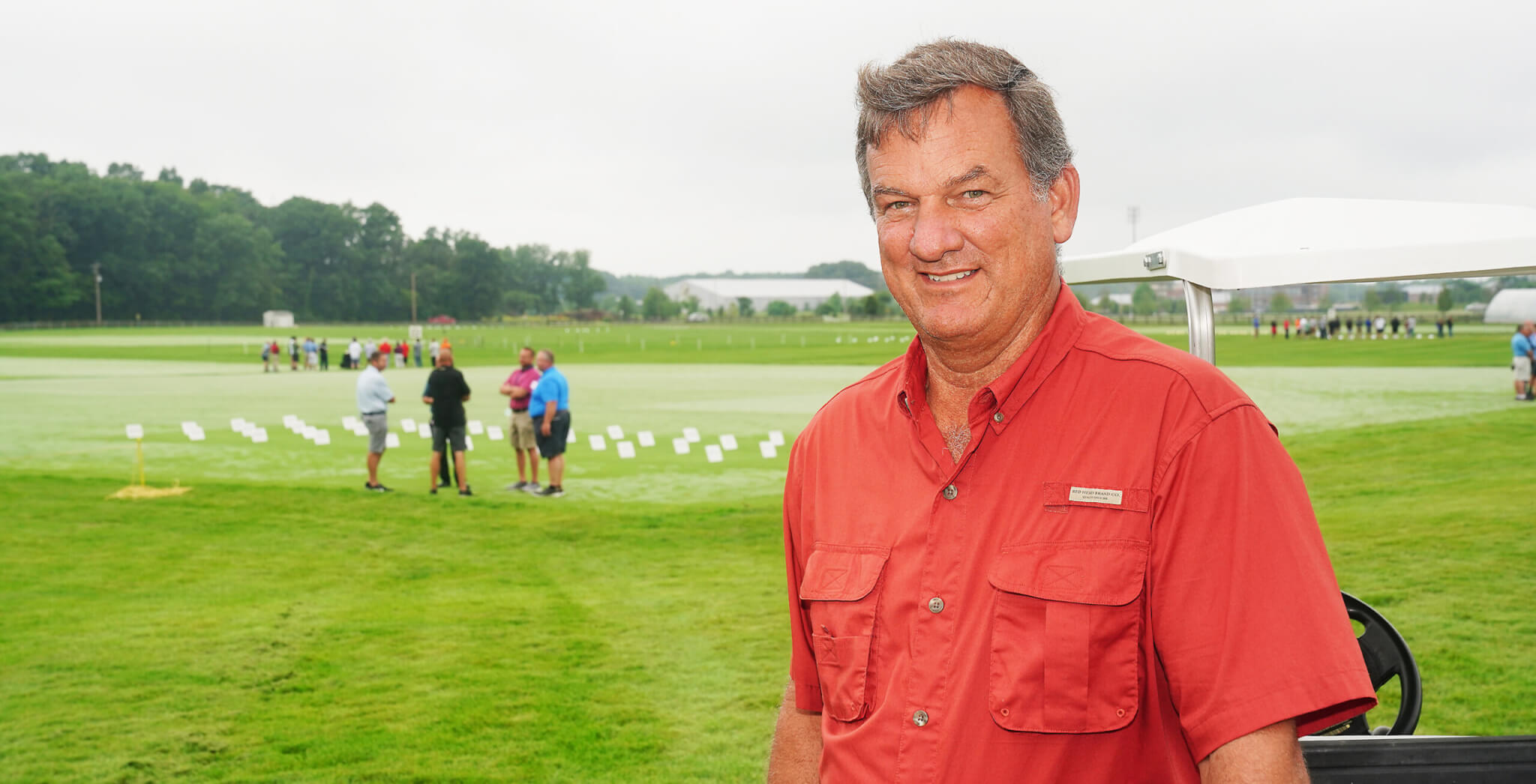Behind the Research: Glenn Hardebeck
About the feature
Many people are involved in the remarkable range of programs, services and facilities that undergird research in the College of Agriculture. Collectively they’re integral to the college fulfilling its research mission. “Behind the Research” explores their individual roles. Each academic year, we profile six people whose work supports the College of Agriculture’s global reputation for developing innovative, multidisciplinary solutions to challenges and then putting those solutions into action.
Glenn Hardebeck, Turf Research Center Manager, Department of Horticulture and Landscape Architecture
- Manages research facilities that include a classroom, meeting room, dry lab, equipment repair and more than 20 acres of turfgrass research plot space.
- Has worked to make the Daniel Center increasingly self-sufficient to produce a wide range of turf areas for research.
- Has guest lectured to classes in Purdue’s turf program and at events for the Master Gardener program, Indiana Green Expo, Indiana Professional Lawn & Landscape Association, Northwestern Indiana Nursery Landscape Association, and commercial pesticide applicator training programs.
Glenn Hardebeck learned to play golf from his grandfather but recalls being more interested in driving the golf cart than hitting the ball. At 15, he started a part-time job working on the course at Benton County Country Club. “I didn’t realize there were bigger and better things than the little nine-hole golf course I worked on for five summers,” he says.
The native of Earl Park, Indiana, came to Purdue to study engineering. Once he discovered turfgrass science, however, he switched to agronomy. (The major is now housed in horticulture and landscape architecture.) After graduating in December 1992, Hardebeck landed a job as assistant superintendent at Lafayette Country Club.
In early 1996, he joined the landscape and irrigation installation crew in the Purdue grounds department, which capitalized on his upbringing around farming: “I had always worked outside and worked on equipment,” he explains.
A year-and-a-half later, he became a turfgrass research technician and began a master’s degree under the supervision of former Purdue Extension turfgrass specialist Zac Reicher. In 2004 Hardebeck began working for Cale Bigelow, professor of horticulture, and was named turf research center manager in 2010.
Today Hardebeck manages the building, facilities, and outdoor acreage at Purdue’s William H. Daniel Turfgrass Research and Diagnostic Center. Up to 5,000 people use the center each year.
Labs serve as prep space for treatment of 20+ acres of irrigated turf research plots, including two acres of golf course greens. However, “it’s not just golf turf,” Hardebeck says. “It’s also sports turf and lawn care research space that benefits the green industry and homeowners.”
The plots mimic conditions across the state, he adds. They also serve as outdoor classrooms. In addition to horticulture researchers, faculty from agronomy, entomology, and botany and plant pathology as well as from private industry conduct studies at the center.
“Turfgrass research efforts at Purdue include many individuals from multiple departments and disciplines in the College of Agriculture,” Hardebeck says. “A strong reliance on applied field research is shared among those varied disciplines, and the center provides the research plot space and close cooperation to accomplish research objectives, whether it requires a golf green or an acre of solid crabgrass.”
About that crabgrass. “On a golf course, everything is supposed to be perfect all the time,” Hardebeck says. “Here, what perfect is, is different.”
In the process of looking for solutions to real-world problems, “we do a lot of things intentionally wrong — exactly the opposite of what I was taught to do,” he explains. “But you can’t do weed research if you don’t have the weeds to control. You can’t do pathology work if you don’t have disease on the fairways.”
Although researchers usually have their own sprayers, Hardebeck oversees the center’s turf maintenance equipment. He also clears any planned mowing or fungicide application with the researchers to avoid unintentionally disturbing their work: “Once you mow something or apply something, you can’t take it back,” he says.
He and his assistant Ben Royal also train the student employees who work at the facility.
Hardebeck has a soft spot for the students who come to the job never having been on a tractor or driven a stick shift and who can’t believe that a mower can cost over $40,000. “Basically their car is the only thing they’ve ever run,” Hardebeck says. “I tell them, ‘that’s fine. You’ll know how to operate everything here by the end of the summer.’ I enjoy trying to help them figure out how to get things done.”







